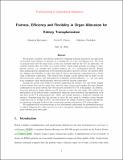Fairness, Efficiency, and Flexibility in Organ Allocation for Kidney Transplantation
Author(s)
Farias, Vivek F.; Trichakis, Nikolaos; Bertsimas, Dimitris J
DownloadBertsimas_Fairness efficiency.pdf (463.4Kb)
OPEN_ACCESS_POLICY
Open Access Policy
Creative Commons Attribution-Noncommercial-Share Alike
Terms of use
Metadata
Show full item recordAbstract
We propose a scalable, data-driven method for designing national policies for the allocation of deceased donor kidneys to patients on a waiting list in a fair and efficient way. We focus on policies that have the same form as the one currently used in the United States. In particular, we consider policies that are based on a point system that ranks patients according to some priority criteria, e.g., waiting time, medical urgency, etc., or a combination thereof. Rather than making specific assumptions about fairness principles or priority criteria, our method offers the designer the flexibility to select his desired criteria and fairness constraints from a broad class of allowable constraints. The method then designs a point system that is based on the selected priority criteria and approximately maximizes medical efficiency—i.e., life-year gains from transplant—while simultaneously enforcing selected fairness constraints.
Among the several case studies we present employing our method, one case study designs a point system that has the same form, uses the same criteria, and satisfies the same fairness constraints as the point system that was recently proposed by U.S. policy makers. In addition, the point system we design delivers an 8% increase in extra life-year gains. We evaluate the performance of all policies under consideration using the same statistical and simulation tools and data as the U.S. policy makers use. Other case studies perform a sensitivity analysis (for instance, demonstrating that the increase in extra life-year gains by relaxing certain fairness constraints can be as high as 30%) and also pursue the design of policies targeted specifically at remedying criticisms leveled at the recent point system proposed by U.S. policy makers.
Date issued
2013-02Department
Massachusetts Institute of Technology. Operations Research Center; Sloan School of ManagementJournal
Operations Research
Citation
Bertsimas, Dimitris, Vivek F. Farias, and Nikolaos Trichakis. “Fairness, Efficiency, and Flexibility in Organ Allocation for Kidney Transplantation.” Operations Research 61, no. 1 (February 2013): 73–87.
Version: Author's final manuscript
ISSN
0030-364X
1526-5463